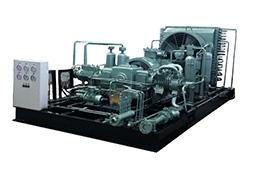Sales Department: 0552-3825188 0552-3825333
Accessories Department: 15955260712
Company Fax: 0552-3825255, 3825200
CNG Department: 13865028777 13865066118
After-sales service: 0552-3825155 0552-3825156
Company Address: No. 2581, Shuangdun Road, Huaishang District, Bengbu, Anhui Province
Company email: zdysj@126.com ahzdysj@126.com
The difference between different lubricants for natural gas compressors
1. Viscosity-temperature properties
Fluorochlorocarbon oil: Fluorochlorocarbon oil has slightly changed its viscosity-temperature properties due to the introduction of some chlorine atoms into the molecule.
Perfluoropolyether oil: Perfluoropolyether oil molecules have introduced ether bonds, which increases the activity of the main chain, so its viscosity-temperature properties are better than those of fluorocarbon oil.
2. Density
The density of CFC oil and perfluoropolyether oil is relatively high, about twice that of mineral oil. Density has no effect on oil performance.
3. Condensation point
The pour point of perfluoropolyether oil is low, and the pour point of fluorocarbon oil increases as its chlorine content decreases.
4. Material compatibility
Fluorinated oil has good compatibility with most metals, rubbers, and plastics. Metal materials: However, for special gas compressors, oxygen compressors, and oil pumps that use aluminum as friction parts, if fluorocarbon oil is used as lubricant, there will be silver-gray solid powder formed by aluminum suspended in the oil, so it cannot be used for lubrication of friction parts of aluminum and its alloys. In addition to causing copper and its alloys to change color at 49 degrees Celsius, fluorocarbon oil is not corrosive to other metals below 177 degrees Celsius. This oil cannot be used for aluminum threads or aluminum parts with high shear forces, otherwise it will cause explosions and form aluminum halides and carbon particles. Perfluoropolyether oil does not have such problems. Rubber and plastic materials: Fluorocarbon and perfluoropolyether oils have good compatibility with most rubbers and plastics.
5. Lubrication performance
Using a 4-ball machine to measure the no-seizure load, CFC oil is higher, followed by perfluoropolyether oil, but both are higher than general mineral oil.
6. Thermal stability
Perfluoropolyether oil is generally 260-300 degrees Celsius, and CFC oil is 220-280 degrees Celsius. This shows that perfluoropolyether oil is more resistant to high temperatures.
7. Environmental protection
Since CFC oil contains chlorine, its use has been restricted or banned in Europe and the United States.
8. Equipment safety
Since CFC oil contains chlorine, there will be free chlorine in the working state, which will corrode the special gas compressor, thus causing losses to the special gas compressor and generating production risks.

Related News
- How to adjust the air volume of the air compressor?
- The status quo and development trend of compressor technology
- Knowledge about daily maintenance of air compressors
- Reasons for lack of compressor displacement
- What are the common faults of compressors?
- Maintenance of natural gas compressor
- Safe use of vinyl chloride compressors
- Analysis of several common failures of dimethyl ether compressor
- The structure and characteristics of vinyl chloride compressor
- How to maintain the vinyl chloride compressor?
- What is the clearance volume of an ammonia compressor?
- Faulty components caused by the operation of ammonia compressor
- How to set up combustible gas detection points in natural gas compressor rooms
- Requirements for selecting air compressors
- What are the parts of energy wasted by natural gas compressors?
- Control method of natural gas compressor
- Components of nitrogen compressor and price conversion method
- Operation analysis of ammonia compressor before and after startup
- Components and prices of nitrogen compressors
- Nitrogen compressor maintenance



